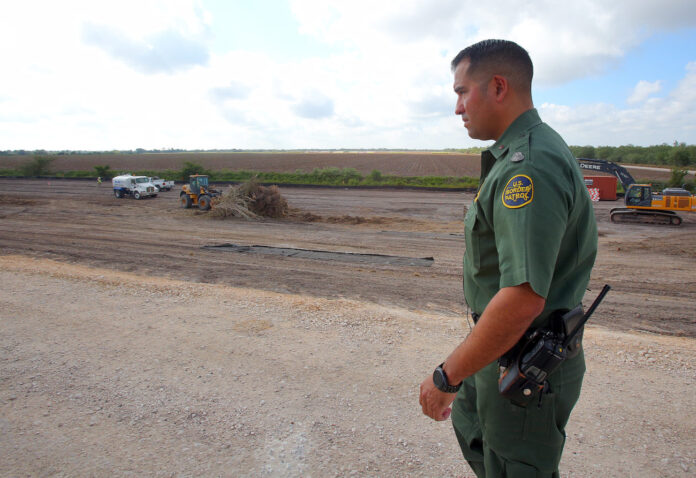A month after the last set, the Trump administration issued a new set of waivers Thursday for between roughly 60 and 80 miles of barriers along the U.S.-Mexico border in the Rio Grande Valley.
The U.S. Department of Homeland Security issued the waivers that go into effect Thursday for barriers across land that stretches from Starr County to Cameron County.
“…The Acting Secretary of Homeland Security has determined, pursuant to law, that it is necessary to waive certain laws, regulations, and other legal requirements in order to ensure the expeditious construction of barriers and roads in the vicinity of the international land border in Cameron County, Texas, Starr County, Texas, and Hidalgo County, Texas,” the filing, which was published Thursday, read.
The waivers come as the beginning phases of wall construction and other preliminary steps continue throughout the Valley, with recent road clearing taking place near Donna, where construction crews are clearing land for patrol roads.
According to U.S. Customs and Border Protection, the contracts for this construction were awarded in late September with construction set to begin for these waivers “in early 2020 pending availability of real estate.”
CBP officials noted that construction would bypass environmentally sensitive areas in the RGV.
“Border wall construction will not take place within the Santa Ana National Wildlife Refuge, La Lomita Historical Park, Bentsen-Rio Grande Valley State Park, within or east of the Vista del Mar Ranch tract of the Lower Rio Grande Valley National Wildlife Refuge, or the National Butterfly Center,” according to the agency’s website.
Opponents of the wall, including local private landowners and conservation groups, have derided the president’s efforts to build walls here locally as “nonsensical, hateful,” and “immoral,” among other criticisms.
Laiken Jordahl, a borderlands campaigner with the Center for Biological Diversity, said the waivers would suspend dozens of laws in order to speed up construction of the new barriers in the Valley.
Jordahl and organizers from the center, a conservation group based in Tucson, Arizona, have made several trips in recent years to the Valley in its efforts to bring awareness to the wildlife believed to be threatened by wall construction.
Also, Jordahl was part of the protest against wall construction at Santa Ana National Wildlife Refuge in early 2018, which was spared, for now, from construction in the last border wall deal.
“Trump is recklessly casting aside the most critical laws on the books to rush construction of his hateful wall,” Jordahl said. “If these walls are built, wildlife will die, families will lose their homes and the public will be walled off forever from their beautiful Rio Grande. We won’t let this happen without a fight.”
The center sued the Trump administration in 2018 to challenge border wall construction in Hidalgo and Cameron counties, and near the Santa Teresa Port of Entry in New Mexico as well as for the emergency declaration.
The lawsuit, which was filed March 22, 2018, challenged the administration’s wall waivers, which they claimed was granted in 2006, but no longer applied because it only applied to border wall construction under the 2006 Secure Fence Act. This set into motion the construction of 700 miles of border barriers during that time.
The lawsuit specifically challenged the DHS waiver of 25 laws to speed construction of 20 miles of border wall in eastern New Mexico, where DHS wanted to convert vehicle barriers into bollard walls along the border west of El Paso at the Santa Teresa Land Port of Entry.
But in early September, U.S. District Judge Ketanji Brown Jackson dismissed the lawsuit brought about by the center, Southwest Environmental Center, Defenders of Wildlife, and the Animal Legal Defense Fund.
Despite that ruling, officials with the center were still weighing its options with regard to an appeal.
On Thursday, U.S. Rep. Vicente Gonzalez, D-McAllen, in reference to the news of the new waivers, released a statement characterizing Trump’s proposed wall “ineffective,” and his use of federal funds towards that end, as “a misappropriation.”
“President Trump continues to blatantly misappropriate government funds, ignore the pleas of Texas landowners and seize land like a medieval feudal lord,” Gonzalez said. “We do need to secure our border and crack down on criminal activities. But that is done best by engaging with our Mexican and Central American neighbors to address the violence and economic inopportunity in their countries and investing in technology and human capital — not building a frivolous border wall.”





